Though Isabelle Wen's (溫慶珠) latest spring/summer offering on the weekend was her favored combination of feminine frills and sequins, there was an edge that had observers saying it was one of her best collections yet.
The "Twirling Sofi" show at the designer's restaurant/lounge bar in Taipei may have been inspired by sufism and the dance of the whirling dervishes that is said to represent a spiritual journey to perfection, but it had the fashionable advantage of being sexy too.
Transparent tops, chiffon and lace set off by golden threads and colored sequins were combined for a look that was fresh and lively, with nods to the 60s and counter culture. A model twirling round in a gossamer light mini skirt was a magical and powerful image that summed up the show.
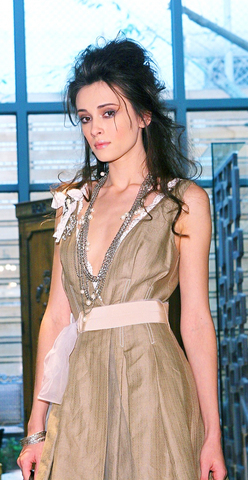
PHOTOS COURTESY OF ISABELLE WEN
And since this year is the 20th anniversary of the founding of her design company, the collection was an achievement that deserved all the applause it got. The Taipei fashionista has hit a high point in her career and the only problem is keeping up the momentum.
Wen has recently added a boutique to the number of stores that sell her clothes and has also successfully diversified, publishing a bimonthly style magazine, as well as opening Fifi restaurant, W lounge bar and the Japanese restaurant Bamboo. Her reputation is secure here and China beckons.
But behind success there is sometimes sadness. A brush with a life-threatening illness and overcoming a creative hiatus six years ago has made Wen more appreciative of life's blessings and drove her to reach greater heights. Even so, she said her public image was "a shell."
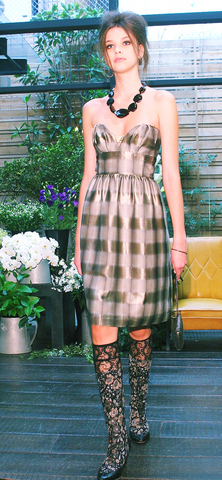
"Though I may be sick and tired it is my job to make people happy. I don't want them to see just the horrible side of life, it is my job to reveal beauty," Wen said in an interview on Tuesday at her studio and workshop in Shihlin. "Some people think I'm Superwoman, but you know that is just face."
Wen said her current collection was, to an extent, the result of overcoming problems. In fashion as in art, there is no gain without pain.
"I was listening to a midnight radio station called Ai Yue Diantai (
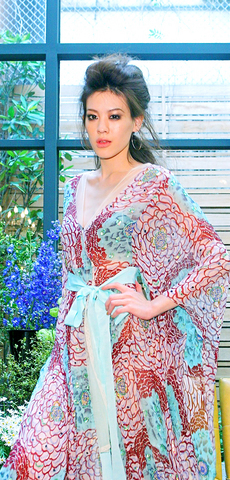
Like the dervish who attains a zen-like state, Wen said the music had helped her put "spiritual and material together" to come up with a concept for her show, "which is a way of letting fabric tell the story."
Wen's tale is an interesting one. Her father was a general in the Chinese Nationalist Party (KMT) and arrived with his wife on these shores in 1949. Wen was born in Taipei but spent time in Pingtung and Tainan, where her father later served as a police chief. It was her mother, however, who introduced the young Wen to the world of fashion.
"She was a real artist," Wen said. "She showed me around art galleries and introduced me to fashion. I remember going to the tailor with her around the age of five or six and I would tell them what I wanted."
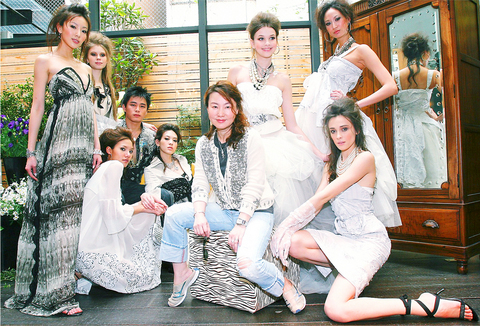
"First I dressed myself and others for my parents' parties; then I did the same for my friends' parties. Now it's my party. I have always done this. I have always followed my heart."
It was clearly a reasonably privileged upbringing. Her older sister Lily Wen (
"I didn't want to follow in anyone else's footsteps, I wanted to create my own life. ... As women we hide our true character until we die. If we do not then our men will not stay with us."
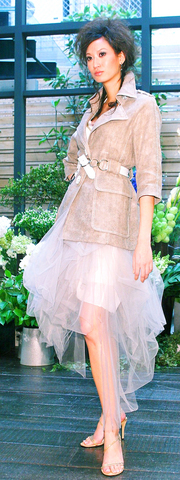
Though she attended Tanshui's Oxford College and did a course in tourism, her heart was in painting and she was the pupil of renowned painter O How-nien (
When her father died and her mother and older siblings emigrated to the US, "Fifi" as she was nicknamed, stayed in Taiwan and dressed the windows of a department store. She was then given some money in 1986 to start her own business in Dihua Street.
The fabric market in this area was the heart of Taiwan's rag trade at the time and Wen's progress mirrors that of Taiwan's fashion industry as a whole.
"When I started no-one bought local designs, everything was imported from Hong Kong, Europe and the United States. We knew nothing. This was the first stage. Now we have a lot of knowledge, but little understanding. This is the second stage."
The third step, according to Wen, is the relative maturity of Western fashion markets and successful branding.
"But I tell you, Beijing, Shanghai, these places will be as good as and better than New York and Milan. I guarantee you, in 10 years time, this is where the world will be looking."
Wen is also looking to China. But first, she says, "I want the world to know that Taiwan has great design."

On April 26, The Lancet published a letter from two doctors at Taichung-based China Medical University Hospital (CMUH) warning that “Taiwan’s Health Care System is on the Brink of Collapse.” The authors said that “Years of policy inaction and mismanagement of resources have led to the National Health Insurance system operating under unsustainable conditions.” The pushback was immediate. Errors in the paper were quickly identified and publicized, to discredit the authors (the hospital apologized). CNA reported that CMUH said the letter described Taiwan in 2021 as having 62 nurses per 10,000 people, when the correct number was 78 nurses per 10,000

As we live longer, our risk of cognitive impairment is increasing. How can we delay the onset of symptoms? Do we have to give up every indulgence or can small changes make a difference? We asked neurologists for tips on how to keep our brains healthy for life. TAKE CARE OF YOUR HEALTH “All of the sensible things that apply to bodily health apply to brain health,” says Suzanne O’Sullivan, a consultant in neurology at the National Hospital for Neurology and Neurosurgery in London, and the author of The Age of Diagnosis. “When you’re 20, you can get away with absolute

May 5 to May 11 What started out as friction between Taiwanese students at Taichung First High School and a Japanese head cook escalated dramatically over the first two weeks of May 1927. It began on April 30 when the cook’s wife knew that lotus starch used in that night’s dinner had rat feces in it, but failed to inform staff until the meal was already prepared. The students believed that her silence was intentional, and filed a complaint. The school’s Japanese administrators sided with the cook’s family, dismissing the students as troublemakers and clamping down on their freedoms — with

As Donald Trump’s executive order in March led to the shuttering of Voice of America (VOA) — the global broadcaster whose roots date back to the fight against Nazi propaganda — he quickly attracted support from figures not used to aligning themselves with any US administration. Trump had ordered the US Agency for Global Media, the federal agency that funds VOA and other groups promoting independent journalism overseas, to be “eliminated to the maximum extent consistent with applicable law.” The decision suddenly halted programming in 49 languages to more than 425 million people. In Moscow, Margarita Simonyan, the hardline editor-in-chief of the